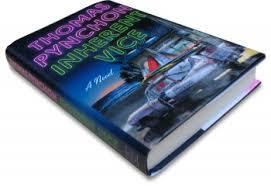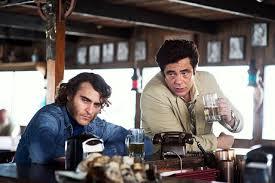There are films that make you want to run to the bookstore or, in reality, Amazon.com. Any Jane Austen or Dickens adaptation. Atonement. Requiem for a Dream perhaps.
Then there is Paul Thomas Anderson's adaptation of Thomas Pynchon's Inherent Vice starring Joaquin Phoenix, Josh Brolin, Owen Wilson, Martin Short, Reese Witherspoon, Maya Rudolph, Benicio Del Toro plus a bevy of other game thespians. Screened at the New York Film Festival at Lincoln Center this past weekend, this adaptation has a contrary effect. It makes you want to hightail it to the incinerator with every Pynchon paperback you might own. Farewell, V. Sayonara, Gravity's Rainbow.
But before I get too critical, let me just note that this apparently was a project of love for Anderson. Anyone who would tackle Pynchon's verbiage and hope to get a slightly comprehensible screenplay out of it would only do so out of an illimitable devotion for the author. Anderson's chance of success, of course, was equal to going over Niagara Falls in a barrel and still being able to tap dance afterwards.
Just peruse the opening sentence of Pynchon's 1966 novel, The Crying of Lot 49: "One summer afternoon Mrs. Oedipa Maas came home from a Tupperware party whose hostess had put perhaps too much kirsch in the fondue to find that she, Oedipa, had been named executor, or she supposed executrix, of the estate of one Pierce Inverarity, a California real estate mogul who once had lost two million dollars in his spare time but still had assets numerous and tangled enough to make the job of sorting it all out more than honorary."
Is there a celluloid syntax equivalent to Pynchon's richly comic, daringly acrobatic prose? Anderson--up there with Terry Gilliam, the Wachowskis, and Guy Maddin--would be one of the more obvious auteurs to be considered capable of mastering such a challenge. After the artistic triumphs of Punch-Drunk Love and Magnolia, one should never underestimate this helmer.
And truthfully, Inherent Vice starts off promisingly enough, capturing the drug-fueled, sexually laissez-faire, anti-cop attitudes of the era with flair. The year: 1970. The locale: Gordita Beach, California (a fictionalized take on Manhattan Beach). Doc Sportello (Phoenix), a dedicated pothead, is awoken one day by his ex-girlfriend Shasta Fay Hepworth (Katherine Waterston). She needs his help. She's having an affair with Mickey Wolfmann (Eric Roberts), a real estate mogul, whose wife Sloan (Serena Scott Thomas) has asked for Shasta's help in having Mickey committed to a mental institution. Soon Nazi motorcycle gangs, coke smugglers, the LAPD, a pedophile dentist, an ex-heroin addict turned Republican spy, and Jade (Hang Chau), a sex-worker whose specialty is receiving cunnilingus, is added to mix. And this goes on for 148 minutes.
With each additional plot ingredient and allusion to astrology, Inherent Vice becomes more and more muddled, but what's worse, more and more mind-numbing. Scene after disconnected scene, that aren't exactly aided by the non-acting of Owen Wilson or the only occasionally witty yammering of his peers or Anderson's disjointed direction, make you pray for an ending that you believe will never come. Like a coke addict, who believes his mile-a minute nonsensical babbling is amusing, Inherent Vice outstays its welcome by at least two hours.
This is not to say Phoenix doesn't try to supply another fine performance, but he has trouble battling the inept, hippie-elemental chaos surrounding his Doc. The actor eventually allows his skills to reach the rock-bottom level of the rest of the proceedings that a quote from Gravity's Rainbow might best elucidate: "There is no real direction here, neither lines of power nor cooperation. Decisions are never really made - at best they manage to emerge, from a chaos of peeves, whims, hallucinations and all around assholery. "
At the press conference after the screening, Anderson noted that he was inspired by Howard Hawks' 1946 classic The Big Sleep, a film that fascinated him yet which he found incomprehensible. No more need be said.



